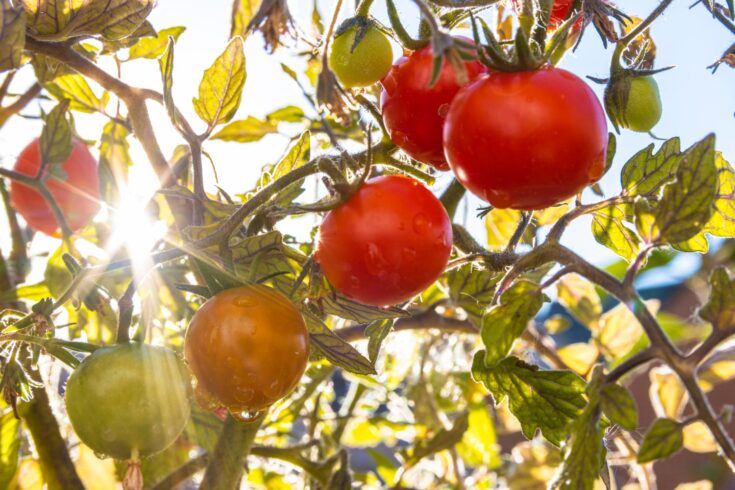If successful, the ViTaL-D Study would be a step towards using biofortified gene edited tomatoes to address a growing global problem of vitamin D deficiency.
The ‘sunshine’ vitamin
Vitamin D is essential for helping the body absorb calcium and phosphorus, keeping bones, teeth and muscles strong, and supporting the immune system to fight infections.
It is produced naturally in the skin when it’s exposed to sunlight.
But in autumn and winter when there’s less daylight and people are more covered up, vitamin D is sourced from the diet.
Foods rich in vitamin D include oily fish, red meat and egg yolks, but plants lack this essential vitamin.
Vitamin D deficiency
One in five people in the UK are deficient during winter and spring and worldwide almost one billion lack enough vitamin D.
The prevalence isn’t uniform; people with darker skin, older people, pregnant and breastfeeding people, and people who are confined indoors are more likely to be deficient.
Low levels have been linked to conditions such as depression, dementia, and an increased risk of certain cancers.
Gene-editing
Some plants, including tomato, make a precursor of vitamin D, called pro-vitamin D3 as an intermediary, which is then converted to compounds the plant uses for defence.
Using gene editing, researchers precisely tailored the genes in tomato plants so they accumulate very high levels of pro-vitamin D3 in the fruit and leaves.
Biofortified tomatoes
Unlike foods fortified during processing, these tomatoes are biofortified so the plants themselves produce higher levels of pro-vitamin D3.
Exposure to sunlight or shining ultraviolet light B on the plants converts pro-vitamin D3 into vitamin D3, which is the more stable form that’s useful for humans.
Each tomato has as much vitamin D as two eggs or 28g of tuna, two recommended sources.
This change in the genetic makeup does not affect the appearance or growth of the plants, or their yield.
ViTaL-D Study
The Quadram Institute and John Innes Centre will enroll 76 participants with low vitamin D levels to the ViTaL-D Study, funded by the Biotechnology and Biological Sciences Research Council (BBSRC).
Participants aged over 18 and living within 40 miles of Norwich, where the research is taking place, will consume a portion of tomato soup daily for three weeks.
Research will then see if this leads to an increase in their blood of the active form of vitamin D that helps us stay healthy.
First-of-its-kind trial
Professor Cathie Martin FRS, group leader at the John Innes Centre, said:
Food is health care – diet has a huge impact on the health of us all and vitamin D deficiency is a widespread problem both here in the UK and the rest of the world.
It has been exciting to use cutting-edge science to enrich a food such as tomato with extra vitamin D3.
In this first-of-its-kind trial we are exploring the impact this produce might have on our diets and health here in Norwich, using tomatoes grown in our glasshouses at the John Innes Centre.
People often take vitamin supplements, but new breeding techniques mean that in the future this already healthy, fresh food that lots of people eat could be fortified with micronutrients from day one, with the potential to help boost the health of all of us.
Tackling a global deficiency
Dr Sarah Perkins, Executive Director of Strategic Planning, Evidence and Engagement at BBSRC said:
This trial is an excellent example of using plant science to improve human health.
By biofortifying tomatoes to produce more vitamin D, we’re investing in a sustainable, practical way to tackle a global deficiency without changing how people eat.
This research shows the power of BBSRC’s long-term investment in plant and nutritional science and the value of partnerships between two of BBSRC’s strategically supported institutes.
Read more about this study on the Quadram Institute website: Need a winter warmer? Groundbreaking gene-edited tomato soup trial with higher levels of ‘sunshine’ vitamin recruiting now.

